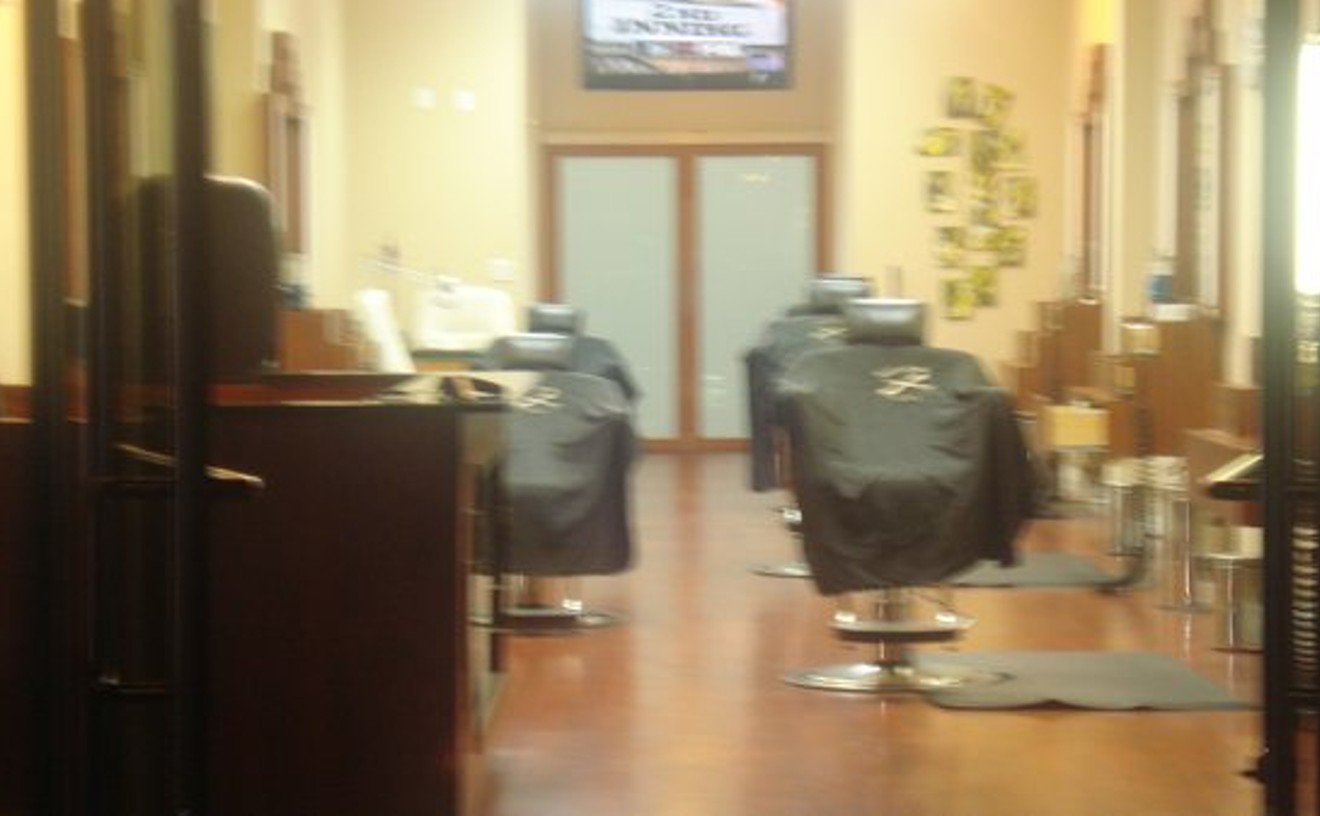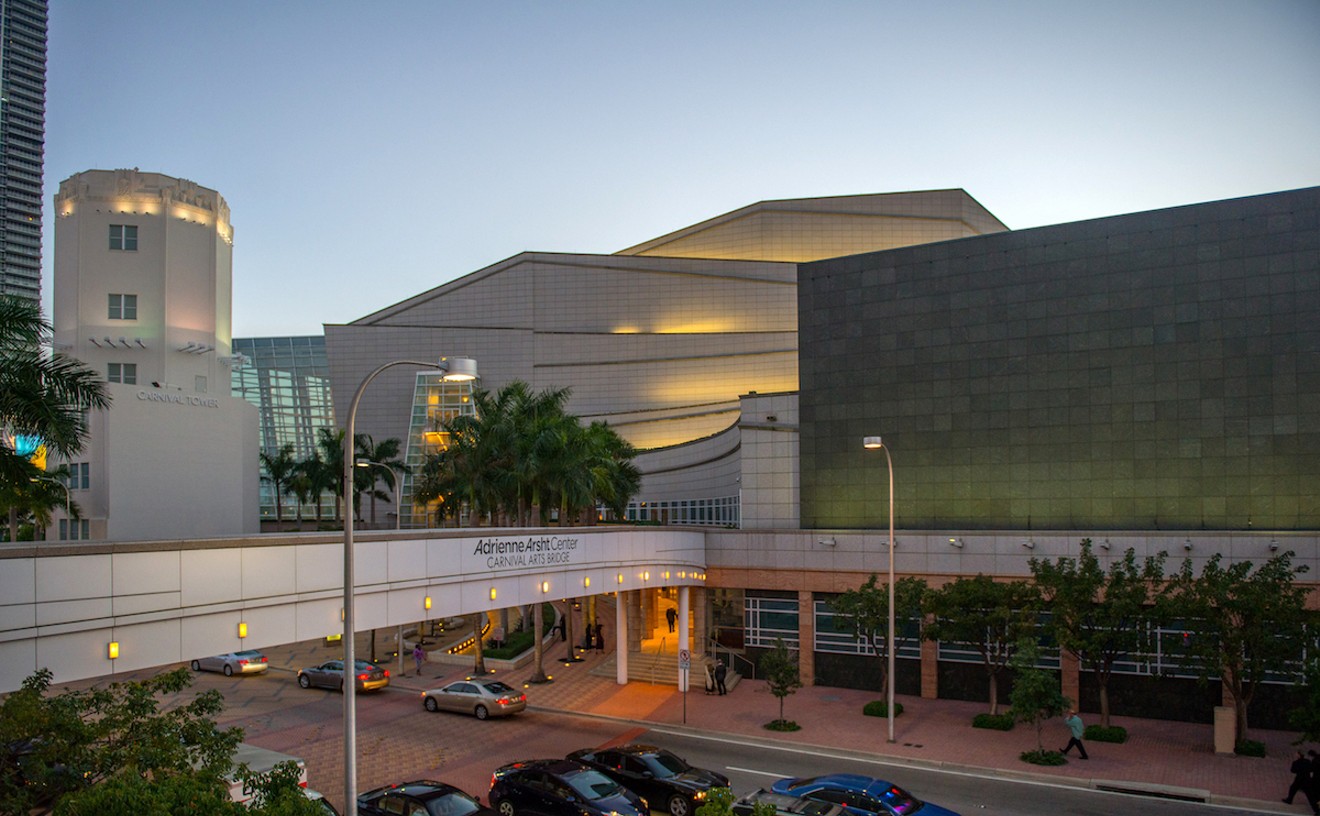It's gone now, but for a few heady days in January, the International Inn adjacent to the 79th Street drawbridge on the Normandy Isle side was no longer the International Inn. It's gigantic green sign, one of the few spectacular neon signs left in Miami, hung over the glittering waters of Biscayne Bay advertising a magical place called "Intern Inn." How the "ational" letters of the sign knew to malfunction in unison to produce a mildly comedic chuckle that would have been downright hilarious in the spring of 1998 is a mystery that local psychics are still trying to parse out. But for those of us who were able to catch it, perhaps on the way home from a long day of trying to sell off a bloated inventory of condo units, while listening to Lakshmi Singh announce the latest death toll in Iraq, it took us back to a simpler time, when all we had to worry about was the commander-in-chief's taste in cigars, and should we throw another five percent into the 401K? Let's throw in another five percent, and while we're at it, get those Goo Goo Dolls tickets. Front row, baby.
Best New Building
The Sands Home
At first glance, this might seem like just another fine example of affordable housing. But Tangelia Sands's new place is the first one in Miami-Dade that is certifiably green, as in Leadership in Energy and Environmental Design (LEED)-certified green. That means builders used renewable materials and designed the home in such a way that the place is considered environmentally friendly to a set standard. Although some upscale buildings have incorporated these elements, this is among the first of its kind built with public money. Remarkably, making the three-bedroom, two-bath home near Liberty Square energy efficient required only an additional $12,850 in construction costs, but Sands and her four kids get to expect an energy savings of $2,500 per year ... while the rest of us get a cleaner environment.
- 1466 NW 61st St., Miami, 33142 Map
Best New Drama
Twenty Six (Marco Ramirez)
The best new drama to hit Miami this year was written in a single night and was less than 10 minutes long. Twenty Six had its first and probably last performance at The 24 Hour Theatre Project, a fundraiser masterminded by the cats at Naked Stage and gamely sponsored by the great Joe Adler, in which assorted playwrights came up with scripts with randomly assigned titles before dawn November 29, which were turned into plays and performed that same night. Most of the submitted pieces went for the funny bone rather than the heart strings, but Twenty Six wasn't one of them. SoFla's daring, darling young playwright Marco Ramirez somehow believed a 10-minute run time was sufficient to sell an audience on a highly improbable premise, get them to fall in love with his characters, and make them all cry. He was right. The show was about a man who had grown to the height of 30 stories overnight. When he woke, he freaked, and while trying to get his bearings, killed quite a few people, including a baby. His sister has been convinced by the military to persuade her brother to take a poison tablet in order to end the threat posed by his unfortunate size. It's not a conversation anybody expects to hear passed between a brother and sister, and few playwrights could have summoned the delicacy needed to pull it off. We're blessed to have one in our back yard.
Best New Trend
Designs razored into haircuts

This year, the fellas grew tired of simple side and center parts in their hair and decided instead to use their scalps for a canvas. Both professional and kitchen-table barbers were bombarded with requests for intricate designs etched into the sides and backs of heads across the city. To say that the tressy trend turned into a form of self-expression would be an understatement. We've seen guys with UM logos in the Gables, delicate star patterns on SoBe, and "Amor" in Hialeah, but we're still looking out for "The Heat Sux" downtown. Jason Amado of the Next Level runs down a few of the styles that have walked out of the shop's doors. "We've done laugh now/cry later, a panther, a dragon, Mohawk with designs on the side, and a lot of tribal designs," he says. "I don't see the trend going away. I think it's something that's always gonna be around because the young kids feel like they gotta get it since we [the older generation] got it back in the day." Some moms have even taken razors to their children's heads and crafted cringe-worthy designs akin to serving a Big Mac at Prime 112. We love them for the penny-pinching effort, but we won't tell them the "cut" looked more like strategically placed bald spots.
- 238 NE First Ave., Miami, 33132 Map
- 305-374-3651
Best Not So Cheap Thrill
A Phantom from Exotic Toys Car Rental
DJ Jazzy Jeff and the Fresh Prince dusted off their dookie chains and came out of retirement just for this occasion. We transcribed.
Fresh Prince: A-yo, Jazzy. Can you please tell me why you never see a rapper driving a Cam-ry? I've seen Lambos and Maseratis, even a Ferrari and a Bugatti — but not a Mazda or a Honda on MTV.
Jazzy Jeff: A-yo, why you worried about what the next man is doing? Go get your own. You got money — who you foolin'?
F.P.: Man, I don't have no cash — shiiit, I'm practically down to my last. I'd be a fool to cop a car if I can't buy the gas.
J.J.: Yeah that wouldn't be a good plan, and you can't ask your pops — your parents just won't understand.
F.P.: But what's this I see? A quick-fix solution. We in business, Jazzy! For 4,500 bones, I can just rent a car that costs more than my home. The Rolls Royce Phantom, top-of-the-line, and for the next 24, this bad boy is all mine!
J.J.: Yeah, that's it, but check this out, Prince. Since you got your credit card out, you might as well go all the way — throw in another 500 beans and have a driver all day.
F.P.: Word, I'm gonna do that. You wanna ride?
J.J.: Man, you already know who's on the passenger side.
Best Opera
David Carlson's Anna Karenina

It's crazy but true: Until 2007, nobody had thought to turn Tolstoy's book into an opera. Maybe that's because not a lot of Russians have composed operas, or maybe it's that setting so much familial intrigue to music is too daunting for composers of any nationality. Whatever the reason, it's nice that we were forced to wait for composer David Carlson. His music is dense, dark, and mysterious — just like the lives it is meant to illuminate in Anna — and given to occasional moments of glittering transparency that leap up out of nowhere and disappear back to the same place. A strong (if starless) cast of people who could act as well as they could sing — soprano Kelly Kaduce, with a lonely timbre and a diaphragm like a bazooka; sweet-voiced Sarah Coburn; the sensual Christian van Horn — gave Colin Graham's libretto all the dramatic punch it needed, and then some. In a year filled with good or great productions of canonical lollipops such as Manon Lescaut and Samson et Delila, Anna felt right at home.
- 1300 Biscayne Blvd., Miami, 33132 Map
- 305-949-6722
- arshtcenter.org
Best Panthers Player
Tomas Vokoun
Tomas Vokoun spent the first four years of his career consumed by an overwhelming fear that he would flop. It turned out he had obsessive-compulsive disorder (OCD), which for him manifested itself in an irrational and overpowering fear of failure. Once Vokoun was properly diagnosed and treated in 2002, his life returned to normal. But the roadblocks to establishing himself as a solid NHL goalie were just beginning. Vokoun rose to be a leader and All-Star for the Nashville Predators, but in April 2006, he was diagnosed with thrombophlebitis of the pelvis, a blood-clotting condition. While recovering, he missed the team's remaining regular-season games as well as the playoffs. He then broke his thumb the next season and was traded to the Panthers in 2007. He's been healthy and solid between the pipes ever since.
Vokoun, age 31, was the only All-Star on the Panthers squad this year, and has emerged as a team leader. When the Cats missed grabbing a share of first place in the Southeast Division after giving up a two-goal lead with 15 minutes to go, Vokoun didn't hesitate to speak his mind.
"It's unbelievable. I don't think words can describe it," he said after the 5-4 loss to the Carolina Hurricanes. "It just shows you our lack of commitment to defense. Many times it didn't cost us, but today it cost us dearly. We basically had the game and gave it to them."
Best Parking on Miami Beach
18th Street, west of Alton
If you're one of those people who gets off work Friday night, drives to Miami Beach, and then starts freaking out because there's no place to leave your car outside your favorite lousy club, you need to face a harsh reality: One way or another, you're gonna have to pay to park. Swallowed that bitter pill? Good! Here's the trick to finding nongarage parking any day or night of the week: Drive along 18th Street, just west of Alton (right by the Office Depot). There is never, ever a shortage of metered parking ($1.25 an hour; it could be worse). From there, it's an easy walk to Lincoln Road. And in our experience, if you don't make it back to feed the bugger, you'll probably squeak by unnoticed. But don't push it, huh?
Best Party of the Year
Common and Erykah Badu at Chakra
At 12:30 a.m. on a hot, humid August 4, the crowd outside Chakra in South Beach was beyond rowdy. The club refused further entry. It was filled to the brim. Glitterati outside flashed their VIP status to no avail. Hosted by local event guru, Gorillas Lifestyle Marketing, this was the hottest night by far during the dead heat of summer, as two hip-hop icons battled it out on a small and intimate stage for 3,000 of their closest friends. Common and Erykah Badu had come to share the spotlight for one night. In case you don't recall or never knew, these acclaimed hip-hop neo-soul artists were once lovers; fans of urban music had daydreamed the pair would produce the next hip-hop messiah. Unfortunately, Badu and Common parted from each other and the music scene. The two kept a low profile until that fateful night at Chakra. Halfway through Common's set, surprise guest Talib Kweli jumped onstage. Talib Kweli! Thank your lucky stars that your ass actually got in!
Best Periodiquito
El Venezolano
In the world of free weeklies, believe us, it's hard to keep afloat. That's why we so admire El Venezolano for its 16 years in the muckraking business. With Hugo Chávez's daily antics to watch and a burgeoning Venezuelan community in Miami to inform, the newspaper has plenty of copy to fill its weekly editions, which are available throughout Miami-Dade and Broward counties as well as Orlando. Founded and run by Venezuelan transplants since 1992, the paper boasts a staff that has earned widespread recognition, including first place from the National Association of Hispanic Publications for its six-week investigative series about how Miami Beach Police abused a Venezuelan tourist. Even more admirable — with an entertainer like Chávez in power — is editor Oswaldo Muñoz's pledge of objectivity.





